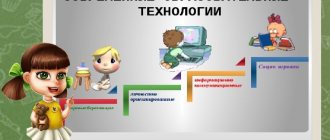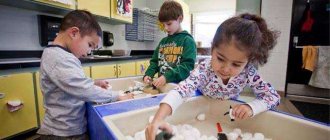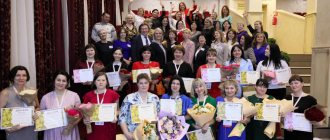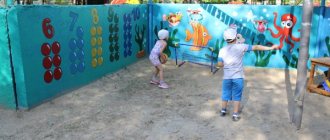Is a job description necessary?
A job description is not a mandatory act. Theoretically, a teacher can work quite successfully without this document. However, in practice, most employers still prefer not to abandon job descriptions. And this is a completely understandable trend, because it is easier for any employee to work when he clearly knows:
- what are the requirements for his position;
- what specific job responsibilities are assigned to him;
- what professional rights he is entitled to enjoy.
It is also beneficial for the employer that a job description be developed and approved for each subordinate specialist. With the help of the latter, the employer will be able to prove the legitimacy of:
- refusal to hire (the applicant does not meet the requirements listed in the instructions);
- application of disciplinary sanctions for failure to fulfill job duties (the employee does not perform or performs his duties improperly, although he knew about the need to perform them, which is confirmed by the employee’s signature confirming familiarization with the contents of the job description).
What complaints do parents often make to teachers?
I decided to write this article based on my own experience, as well as recalling cases from the practice of my employees, and having studied thematic blogs of parents. According to my observations, there are several types of parents: active but harmless, aggressive, adequate, indifferent or too tactful.
The first ones are interested in everything, constantly call and ask about their child, try to do something for the group, and often establish fairly close relationships with the teachers and kindergarten administration. They can be too annoying, but such parents help us a lot, take care of various organizational issues, etc. They usually do not find fault with teachers, do not conflict, but try in every possible way to appease them.
Aggressive ones are a headache for the entire kindergarten. Everyone knows these parents by sight; they constantly write complaints and conflict with teachers and other parents. Of course, everyone suffers from this, including their children, because they feel rejected by the team. A professional teacher does not transfer his attitude towards conflicting parents to their children, but all the same, people are people... This type is always dissatisfied: they didn’t feed them, they didn’t dress them or comb their hair properly, they offended them, they caught a cold, they didn’t wipe their nose...
Adequate parents will not conflict over trifles. But they will not remain silent if they don’t like something. Such parents kindly but firmly explain to the teacher their position and their request. What can I say - this type of parent is the most pleasant for any educator. They know their rights and do not demand the impossible.
Those who are indifferent may truly not care, or they may simply be too intelligent to express their dissatisfaction. They are unable to bring themselves to voice complaints, even if something really ugly happens: the teacher did not take care of the child, and he broke his nose, constantly wears wet pants, is dressed carelessly when going out, etc.
In general, all complaints can be reduced to one thing: poor care and supervision of children. I think any of you, friends, who have children, have many “scary” stories about clueless teachers.
Profession "kindergarten teacher"
A kindergarten teacher is a teacher who teaches and educates preschool children (up to 7 years old). The main field of activity of representatives of this profession is related to organizing the stay of children in a preschool educational institution, conducting games and activities with children, monitoring their safety and health.
Teachers are in demand in state, municipal, private and departmental kindergartens, child development centers, as well as at home.
Teachers can work either independently, for example, in a small private kindergarten, or in a team.
The areas of professional activity of a teacher are education and service.
Schedule
The job responsibilities of a teacher usually include monitoring the children’s daily routine. Children in kindergarten have a clear schedule of what they do and at what time (in time). And this routine has to be constantly monitored.
If children have a quiet hour at 13:00, this means that the kindergarten teacher must monitor the preparation of the kids for bed and, if necessary, help them. With all this, during this period it is also necessary to monitor silence. In practice, an assistant teacher helps with such things.
When children's daily routine is disrupted, the situation has to be quickly corrected. If someone is capricious and does not comply with the schedule, such a child can be punished, although debates about the admissibility of punishment in kindergarten are constantly ongoing. The teacher can scold the child or sit him in a chair for a while.
How to write a job description for a teacher?
The job description of a teacher is usually drawn up by an authorized person, for example, a lawyer or an employee of the personnel service of the department or department, the structure of which includes the preschool educational institution. Sometimes the manager of the garden himself is involved in the development of this document.
When drawing up a job description, it is necessary to take into account the current labor legislation, in particular the Labor Code of the Russian Federation, as well as:
- Professional standard “Teacher”, approved by order of the Ministry of Labor of Russia No. 544n dated October 18, 2013;
- Federal State Educational Standard for Preschool Education, approved by order of the Ministry of Education and Science No. 1155 of October 17, 2013;
- Sanitary and epidemiological requirements for organizations of education and training, recreation and health improvement of children and youth SP 2.4.3648-20.
If we are talking about a specialist in a state, municipal or departmental institution, then the job description must be developed in accordance with the professional standard. For private organizations, the requirements of the professional standard are advisory in nature. But you need to take into account that in any case, the work of a teacher involves contact with children, therefore specialized education and compliance with other legally established requirements (availability of specialized education, absence of medical contraindications, absence of a criminal record) is mandatory.
What kind of knowledge must a teacher have to carry out his activities?
It is clear that basic knowledge of pedagogy and the educational program in the garden is provided by a special educational institution. But specifically, what should a preschool teacher know?
Basic regulatory documents, scientific pedagogical and psychological disciplines, rules:
- Key directions for the development of the modern preschool educational system of the Russian Federation;
- Regulatory and legislative acts within the framework of its activities (according to the Federal State Educational Standard);
- UN International Convention on the Rights of the Child;
- Preschool pedagogy, sociopsychology, developmental psychology;
- Fundamentals of psychological child rehabilitation;
- Psychological and physical characteristics of children with disabilities;
- Methods for monitoring the development of preschoolers and other tools;
- Laws of teacher ethics;
- Methodology and practice of organizing leisure time for preschool children within preschool educational institutions;
- Modern innovative technologies of preschool pedagogy;
- Psychological methods of educational influence on children, the basics of effective communication with parents of students and colleagues;
- Methods and techniques for diagnosing, preventing and eliminating conflict situations in children's and adult groups;
- Fundamentals of sociology, ecology, economics;
- Labor Code of the Russian Federation;
- Fire safety and labor protection rules;
- Sanitary standards in preschool institutions;
- Basics of working with a text editor, etc.
The functions of a teacher cannot be squeezed into a job description template, as you understand. Even the requirements I have listed can be long and tediously supplemented and deciphered. Working with children is every day a test of professional suitability, and simply of humanity.
Speaking in terms, a good teacher must have certain competencies, which are designated by the Federal State Educational Standard. What is included in the list of competencies? These are the qualities and knowledge that provide the necessary conditions for the development of preschool children.
Job description structure
Since a job description is not a mandatory document, the law does not provide for any universal template. In fact, each employer has the right to independently develop a suitable form of instruction for him.
Very often, the structure of a job description is formed by the following 4 main blocks:
- general provisions;
- job responsibilities;
- rights;
- responsibility.
If desired or necessary, the contents of the document can be supplemented with other sections, for example, “Qualification requirements”, “Working conditions in the workplace”, “Procedure for making changes to the job description”, “Final provisions”.
Contents of the job description
Next, we’ll look at what specifically to indicate in each section of the job description for a kindergarten teacher.
General provisions
In the first paragraph, indicate that this document was developed in accordance with current labor legislation, professional standards, Federal State Educational Standards and sanitary and epidemiological requirements.
Please note that this instruction is approved for the purpose of regulating the main job functions, job responsibilities, rights and responsibilities of the teacher, as well as his relationships and connections in his position.
Write down the mechanism according to which a kindergarten teacher is hired and dismissed.
In the next paragraph, list the requirements for a candidate for the position of teacher. Requirements can be taken from the professional standard. In particular, a preschool teacher must meet the following parameters:
- higher or secondary vocational education in the direction of “Education and Pedagogical Sciences” or higher or secondary vocational education and additional vocational education in the field of activity;
- undergoing preliminary and periodic medical examinations, extraordinary medical examinations, mandatory psychiatric examination (once every 5 years), professional hygienic training and certification (when applying for a job and every 2 years), vaccinations, having a personal medical record with the results of medical examinations, data on vaccinations and results of professional hygienic training and certification.
- no restrictions on engaging in teaching activities, as specified in Art. 331 Labor Code of the Russian Federation.
Next, you need to record who the teacher will report to during his work activity. This can be a senior teacher or the head directly.
Indicate that the teacher carries out his work activities in the kindergarten in accordance with this job description.
In the next paragraph, list the laws, regulations, as well as local regulations that guide the teacher in the process of work.
The next two blocks can be devoted to what a teacher should know and be able to do. It is better to write out the lists of necessary knowledge and skills in as much detail as possible. For example, a teacher needs to be well versed in the basic patterns of age-related development, the basics of preschool pedagogy, the theory and methodology of educational work. A preschool teacher in the senior, middle or junior group must also be able to communicate with children, master teaching methods and forms, establish partnerships with parents, and much more.
Pedagogical activity of the teacher
Pedagogical activity of the teacher.
Pedagogical activity can be characterized as a type of social activity that is directed from older generations to younger generations of the culture and experience accumulated by humanity, creating conditions for their personal development and preparation for fulfilling certain social roles in society.
The personality of a preschool teacher is formed, manifested and changed in the process of his professional pedagogical activity, in which the goal, motives, subject of activity, methods of carrying it out, and the result are identified. A feature of the content of educators’ pedagogical activities is pedagogical monitoring, which is aimed at studying:
- the child’s activity skills;
— interests; preferences; child's inclinations;
— personal characteristics of the child;
— behavioral manifestations of the child;
— features of the child’s interaction with peers;
— features of the child’s interaction with adults.
A comprehensive study led by N.V. Kuzmina showed that pedagogical activity and its structure consist of the following internally interconnected components: constructive, organizational, gnostic, communicative.
The structure of pedagogical activity according to N.V. Kuzmina.
| Components | Contents of components of pedagogical activity |
| Structural component | Includes planning, design, selection of material for educational and educational work, as well as interaction with children and parents. Constructive skills are revealed in the ability to foresee possible difficulties in work and in creating conditions for their elimination. Such skills allow you to plan a child’s activities at all scheduled moments, both for a short and longer period, to draw up a plan, lesson notes, entertainment scenarios, and the ability to select factual material in specific areas of knowledge in accordance with the goals and objectives of learning at each age stage. |
| Organizational component | The teacher is able to organize the process of both the activities of children (collective, group, individual), parents (aimed at enhancing joint efforts in raising children, providing assistance to a kindergarten, group), and their own activities. For a good result, you must be able to charge people (both adults and children) with your energy, captivate, activate them, quickly and flexibly apply your knowledge and experience in solving practical problems when leading various types of activities. |
| Gnostic component | The effectiveness of gnostic activity is associated with knowledge of psychology, understanding of the patterns and characteristics of children's development, and the presence of interest in the spiritual world of the child. This component is aimed at understanding the family microenvironment of the child, parents, analyzing one’s own teaching activities, and the work of colleagues. Those skills that are used by the teacher in the process of this activity provide an opportunity to study the subject, identify the level of development of processes (cognitive, emotional, volitional), states, discover the motives of his behavior, the personal qualities of the child, identify the relationships of pupils in children's society, as well as the degree emotional well-being of each of them. |
| Communication component | This component includes establishing and maintaining relationships with students, parents, administration, and colleagues. It is the attitude of the teacher that determines the success of constructive activities and the emotional well-being of the preschooler in the learning process. |
It is generally accepted that the specificity of the activities of a preschool teacher is that he is obliged to provide children with emotional well-being, create psychological and pedagogical conditions for the development of children’s abilities and inclinations, provide them with a wide choice of different types of activities, and individualize education. Education in preschool age does not imply the mandatory acquisition of certain knowledge in a strictly specified volume, which distinguishes it from education at other age stages of child development. A kindergarten teacher raises and teaches children who have their own age characteristics. The teacher also organizes and manages the elementary work and educational activities of his pupils, and is guided by play, everyday activities, and communication activities. These types of activities, due to the age of the children, require special conditions. There are various ways and means for a teacher to get to know his students. In addition to conversations, special experiments, sociometric methods, children's drawings used for this purpose, a teacher can obtain a lot of valuable information about the inner world of children, their attitude towards others, towards kindergarten by observing the behavior of children in everyday life.
The psychology of trust, so necessary for success in working together with a family to raise children, is determined here not so much by objective circumstances or the merits of the teacher (education, the opinion of the administration and colleagues, etc.), but by emotional factors that sometimes allow parents to intuitively guess sensitivity or coldness, kindness or excessive severity of the teacher. The conditions for successful interaction with parents are that the teacher has an internal readiness to act together with the family and a desire to find an approach to the parents, who, in turn, expect the teacher to show attention, warmth, and love for their child, and it is important to meet these expectations. Without this, it is difficult to count on cooperation with them in education.
Professional and personal requirements for a teacher.
In my opinion, the modern requirements for a preschool teacher are slightly different from their usual, classic version. A teacher working with young children has to use more different techniques and use knowledge in order to interest modern children, instill discipline, responsibility, literacy, and a desire to learn.
I believe that the basic requirements for a preschool teacher should be:
High civic responsibility and social activity;
Love for children, the need and ability to give them your heart;
Genuine intelligence, spiritual culture, desire and ability to work together with others;
High professionalism, innovative style of scientific and pedagogical thinking, readiness to create new values and make creative decisions;
The need for constant self-education and readiness for it;
Physical and psychological health, professional performance.
Based on my experience, I can say that all these requirements for a kindergarten teacher affect the level of education of students. I believe that the requirements for the professionalism and personality of a teacher should be as follows:
| Requirements for the professionalism and personality of the teacher | |
| The teacher must KNOW: | The teacher must BE ABLE TO: |
| Psychology of giftedness, diagnostics and methods for its identification, types, stimulating conditions for its development Age-related features of the manifestation of signs of giftedness Programs (comprehensive and specialized) Regulatory framework on the problem Innovative technologies Qualitative characteristics of the necessary developmental subject-spatial environment of the group Modern scientific and methodological literature on the problem Specifics of methods and techniques for developing abilities Individual characteristics and personal potential of the child Specifics of methods and techniques for developing abilities Individual characteristics and personal potential of the child Child's interests Social and material capabilities of the family, family psychological microclimate Opportunities for child development in a family environment Effective forms and methods of working with parents | Create an emotionally comfortable environment and a favorable emotional and psychological microclimate in the group Timely identify children with signs of early giftedness using observation and diagnostic tools Implement a diagnostic and analytical approach to planning and organizing work with children Create a development environment Apply innovative technologies and techniques Stimulate the development of abilities through various forms of work with children Showcase your personal creativity Select activity motivation that is relevant for children Self-improvement (plan a system of self-education) Interact with all preschool specialists working with a gifted child |
| Build positive interpersonal relationships with your child Develop an educational program for circle work Master problem-based learning methods and questioning techniques Organize optimal forms of work with children Organize work with parents Select relevant and accessible information for parents | |
Thus, it can be noted that a modern teacher today needs special professional training. To do this, you need to seriously work on increasing the teacher’s competence, which will allow him to work according to the standard.
A professional standard is a characteristic of the qualifications that an employee needs to carry out a certain type of professional activity or perform a labor function (Part 2 of Article 195.1 of the Labor Code of the Russian Federation). The professional standard combines all the requirements for teachers at all levels of education, approved by order of the Ministry of Health and Social Development of the Russian Federation dated August 26, 2010 No. 761n (registered with the Ministry of Justice of Russia on October 6, 2010 No. 18638). Professional standards are needed in order to determine the qualifications of an employee and the responsibilities for the corresponding position, and are also necessary when developing educational programs (vocational education (part 7 of article 11 of the Law of December 29, 2012 No. 273-FZ); vocational training (part 8, Article 73 of the Law of December 29, 2012 No. 273-FZ) additional professional education (Part 9 of Article 76 of the Law of December 29, 2012 No. 273-FZ).
Two types of standards are now applied to preschool educational institutions (educators, teachers, specialists):
• Federal State Educational Standard, approved by the Ministry of Education and Science of the Russian Federation;
• Professional standard approved by the Ministry of Labor of the Russian Federation.
Both standards were developed in 2013, but relate to different areas: the Federal State Educational Standard concerns educational institutions in general, and the professional standard refers to personnel policies, certification work, the development of job instructions and other actions relating to specific employees.
Final provisions
In the last section, note that the employee must be familiar with the instructions upon hiring.
Indicate the number of copies of the document drawn up, and also establish who is responsible for monitoring the execution of the instructions.
The job description is approved by the head of the preschool educational institution. The fact that the employee has familiarized himself with the document is confirmed by the signature of the person being familiarized, which is affixed both on one of the copies of the instructions and in a special familiarization journal.




